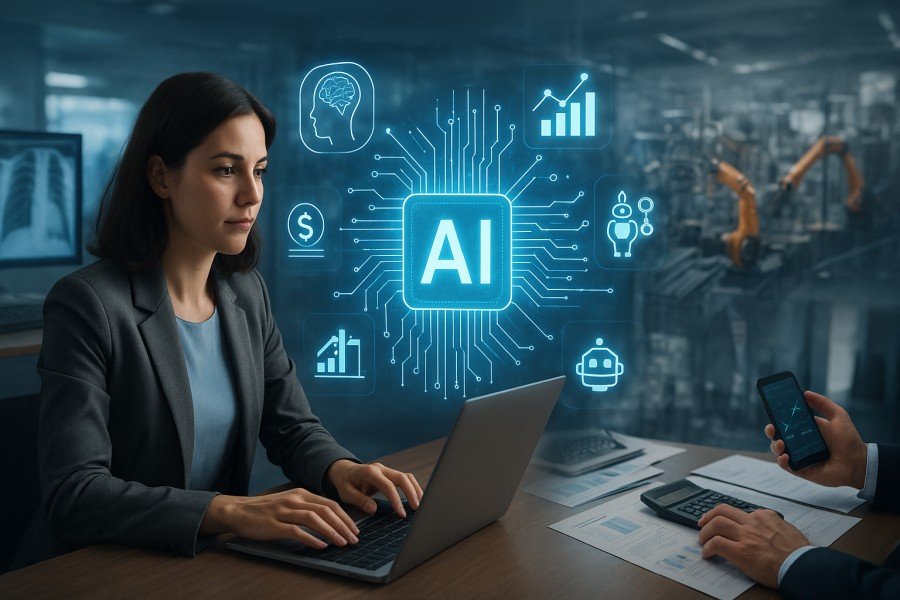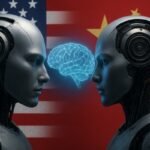Artificial Intelligence is no longer a futuristic concept reserved for tech conferences or research labs. Today, it is transforming industries, streamlining operations, and shaping customer experiences across the globe. From finance to healthcare, manufacturing to marketing, businesses are adopting AI-driven tools to enhance efficiency and unlock new opportunities. The rise of AI in business has become one of the most significant drivers of global economic change in recent years.
The Growing Role of AI in Business
AI is redefining how organizations work. Companies are using machine learning applications to analyze massive data sets in real time, enabling faster decision-making. In sectors like banking and insurance, predictive algorithms help detect fraud and assess risks more accurately. Retail businesses rely on AI-powered chatbots to provide 24/7 customer support, improving customer satisfaction while reducing operational costs.
Startups and emerging companies are also embracing this shift. In fact, many of the startups to watch in the Indian market have integrated AI into their core business models, making them competitive not only domestically but also globally. This trend highlights how AI is no longer exclusive to big corporations but is equally accessible to smaller, agile businesses looking to scale quickly.
AI in Healthcare and Life Sciences
Healthcare has seen some of the most remarkable applications of artificial intelligence. AI systems assist in early disease detection through imaging analysis, helping doctors diagnose conditions like cancer with higher accuracy. Personalized medicine, powered by AI algorithms, allows physicians to tailor treatment plans based on a patient’s genetic data and medical history.
Moreover, AI-powered drug discovery platforms are significantly reducing the time required to bring new medicines to market. What once took a decade can now be achieved in a fraction of that time. The global healthcare industry is expected to continue relying heavily on AI, making it one of the most promising areas for long-term innovation.
AI in Manufacturing and Supply Chains
The manufacturing sector is another area undergoing massive transformation. AI-driven automation is not only speeding up production lines but also ensuring quality control with minimal human error. Robots powered by AI can perform repetitive tasks efficiently, freeing human workers for more creative and strategic roles.
Supply chain management has also improved drastically. AI helps businesses forecast demand, optimize inventory, and streamline logistics. During uncertain events like pandemics or geopolitical disruptions, AI provides real-time insights that enable companies to adapt quickly. This resilience makes AI an indispensable tool for global supply chains.

AI in Finance and Business Operations
Finance has long been a pioneer in adopting new technologies, and artificial intelligence has elevated this trend. AI-powered trading platforms analyze patterns in stock markets and predict movements faster than human analysts ever could. Risk assessment tools help financial institutions create smarter lending models, offering personalized services to customers.
Governments, too, are exploring AI to make fiscal planning more efficient. For instance, reforms like the GST Reforms Big Relief to Middle Class 2025 demonstrate how digital tools and automation are being incorporated into policymaking. AI can support similar reforms by ensuring compliance, reducing errors, and providing transparency in tax systems.
AI in Marketing and Customer Experience
Perhaps one of the most visible uses of AI is in marketing. Personalized ads, recommendation engines on e-commerce sites, and content curation on streaming platforms are all powered by artificial intelligence. Businesses are learning more about consumer behavior than ever before, allowing them to create highly targeted campaigns that deliver better results.
Chatbots and virtual assistants are redefining customer service, making it possible for businesses to offer instant responses. AI also helps in sentiment analysis, where companies monitor customer opinions across social media and respond strategically to maintain brand reputation.
Challenges and Ethical Considerations
While AI offers incredible opportunities, it also brings challenges that cannot be ignored. Issues like data privacy, job displacement, and algorithmic bias need careful consideration. Organizations must adopt ethical AI practices, ensuring that innovation does not come at the cost of fairness and human dignity. Governments and international bodies are actively working on frameworks to regulate the responsible use of AI in business.
The Future Outlook
The future of AI in business is limitless. As computing power increases and AI models become more sophisticated, industries will witness deeper integration of these technologies. Businesses that embrace AI today will be better positioned to thrive in the evolving digital economy.
Artificial intelligence is not just a tool; it is a catalyst for change. Whether it is improving healthcare, streamlining finance, or reshaping global supply chains, AI has proven to be the cornerstone of modern business transformation. The question is no longer whether industries should adopt AI, but how quickly they can adapt to its possibilities.








